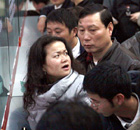Golf
Woods' doctor probed in doping case: source
(Agencies)
Updated: 2009-12-16 09:24
 |
Large Medium Small |
In the therapy, the patient's blood is drawn and put through a centrifuge that separates out the platelets, which are then injected into the area of the injury. The platelets contain growth factors that can heal tissue, said Dr. Allan Mishra, an orthopedic surgeon at the Stanford University Medical Center and one of the leading researchers in the field.
Mishra said research is ongoing, but the therapy has proved successful at treating ailments such as tennis elbow. Starting January 1, the World Anti-Doping Agency is banning the re-injection of platelets into muscles because that may aid in building muscles. But athletes can still inject them into joints and tendons to help recovery from injury if they follow procedures to declare the use to WADA.
Woods announced last Friday he was taking an indefinite leave from golf to concentrate on his marriage after he admitted to marital infidelity. Greenspan suggested his client's case was receiving outsized attention because of the scandal swirling around Woods.
"It's tragic that it happens to come unfortunately at a time when one of his patients is suffering through a media frenzy, which as a result has put him in the eye of the storm as well," he said.
Dara Torres, the only American to swim in five Olympics, told the Times that Galea found a previously undiagnosed tear in her quad tendon.
"Excluding draining my knee, he has never treated me, but I did see his chiropractor who did soft-tissue work on my leg," she said in an e-mail to the newspaper. "That was the extent of my visit with him."
The International Olympic Committee became concerned about Actovegin in 2000 after it appeared during that year's Tour de France, said Dr. Gary Wadler, who leads the committee that determines the WADA's banned-substances list.
The drug was placed on the banned list, then removed a year later because more evidence was needed as to whether it was performance-enhancing or damaging to athletes' health, he said.
"It doesn't seem to have been a major issue in recent times," Wadler said.







